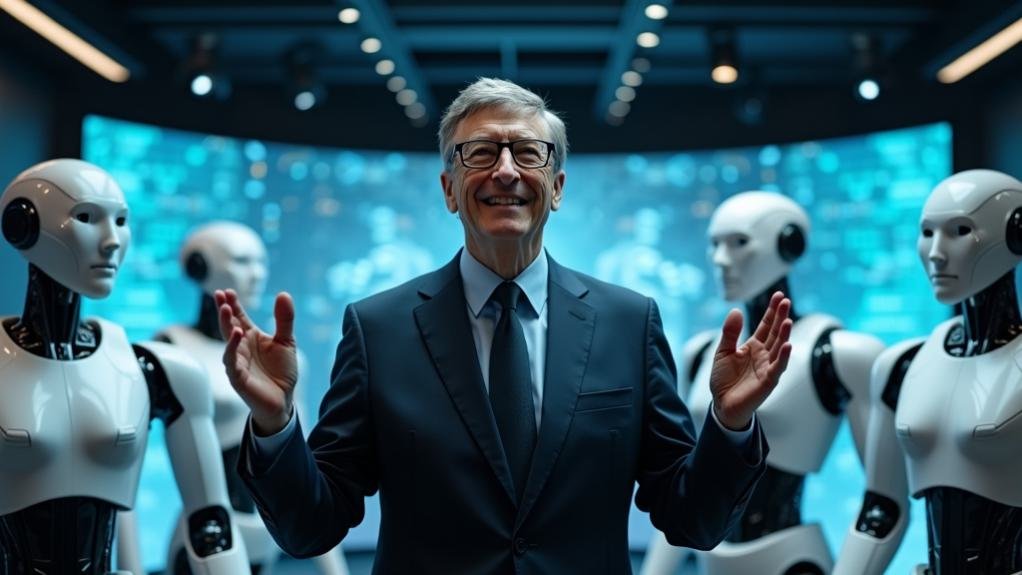Research contradicts Gates’s prediction about AI replacing healthcare and education professionals within 10 years. Studies show AI functions best as an augmentation tool, with AI-assisted diagnoses reaching 94% accuracy only with human oversight. While AI excels at data analysis and routine tasks, it lacks critical human elements like emotional intelligence and ethical judgment. In both healthcare and education, successful outcomes rely on human-AI collaboration rather than replacement, suggesting a future of enhanced professional capabilities through technological partnership.
Despite widespread speculation about artificial intelligence replacing human professionals, experts emphasize that AI will augment rather than replace doctors and teachers in the foreseeable future. While concerns about job displacement have intensified following recent AI advances, research indicates that these technologies are more likely to enhance human capabilities rather than render them obsolete. AI is transforming biomarker research by allowing for early detection of health issues, which assists healthcare professionals in creating proactive healthcare strategies. The ethical implications of AI in healthcare and education require careful consideration, but complete automation of these deeply human-centered professions remains unlikely. Healthcare professionals are increasingly using AI tools to assist with diagnostics, treatment planning, and administrative tasks. Dr. Sarah Chen, Director of Medical AI Research at Stanford, explains: “AI excels at pattern recognition and data analysis, but the practice of medicine requires emotional intelligence, complex decision-making, and ethical judgment that machines cannot replicate.” Studies show that AI-assisted diagnoses are most accurate when combined with human physician oversight, achieving 94% accuracy compared to 89% for AI alone. Operational AI enables healthcare systems to integrate predictive models and task automation, enhancing overall efficiency and service delivery.
AI promises to enhance rather than replace human expertise in healthcare and education, serving as a powerful tool alongside skilled professionals.
In education, AI technologies are revolutionizing personalized learning and administrative efficiency. For instance, Nvidia CEO Jensen Huang envisions AI tutors providing round-the-clock support, transforming traditional education through adaptive instruction. AI-driven software facilitates blind hiring and is transforming how educational institutions manage talent acquisition and retention. However, teachers remain essential for student development, emotional support, and critical thinking cultivation. A recent study by the National Education Association found that 87% of students prefer having human teachers present, even when using AI-powered learning tools. David Thompson, an education technology researcher, notes: “AI can handle routine tasks and provide customized practice exercises, but it cannot replace the human connection that drives effective learning.”
The integration of AI in professional settings has actually created new roles and opportunities. Healthcare institutions report a 15% increase in positions focused on AI implementation and oversight, while schools are adding technology specialists to help teachers leverage AI tools effectively. These trends suggest that rather than eliminating jobs, AI is transforming how professionals work and creating new specializations. Industry experts predict that the most successful implementation of AI will involve collaborative human-AI partnerships. In medical settings, AI assists with initial screenings and data analysis, allowing doctors to focus on patient care and complex decision-making. Similarly, in classrooms, AI handles routine grading and personalized practice sessions, enabling teachers to concentrate on mentorship and higher-order learning activities.
The key to successful AI integration lies in understanding its limitations and strengths. While AI can process vast amounts of data and identify patterns quickly, it lacks the nuanced understanding, emotional intelligence, and ethical reasoning that characterize human expertise. As technology continues to evolve, the focus remains on developing AI systems that complement rather than replace human professionals, ensuring that both healthcare and education maintain their essential human elements while benefiting from technological advancement.

